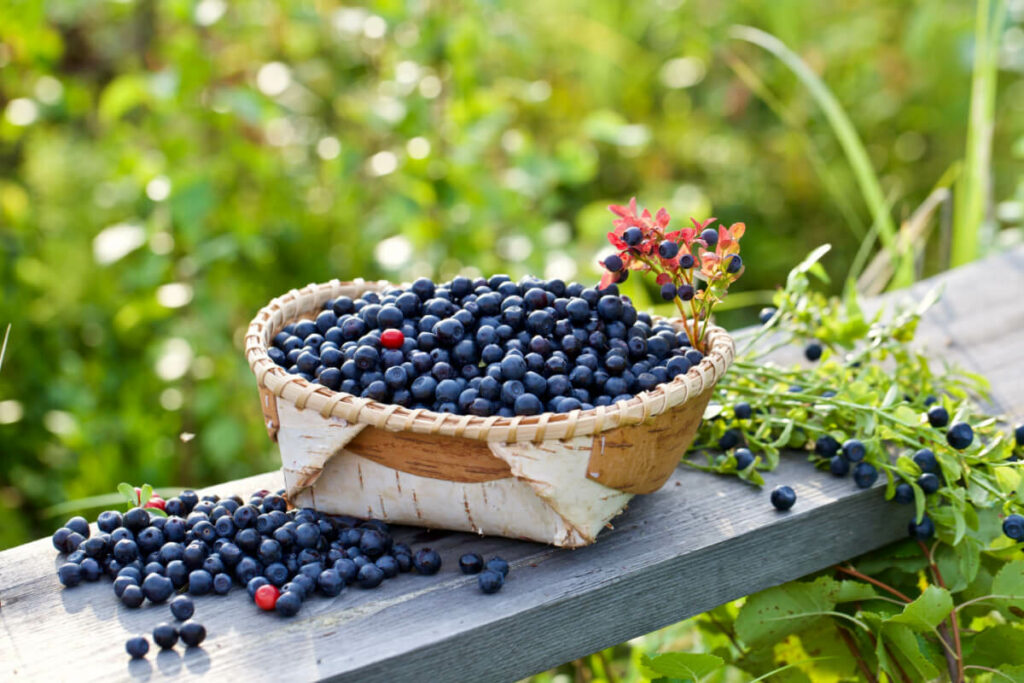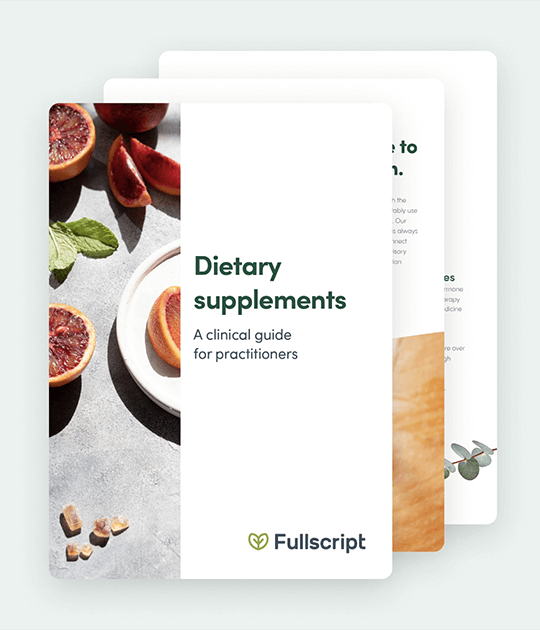You’ve probably tried blueberries, cranberries, and even huckleberries—but have you ever heard of bilberries? Bilberries are part of the same plant family and have many health benefits, including for your eyes, skin, brain, and more. (10) Bilberry is found in dietary supplement form as well as powders, topical creams, and more. Keep reading to learn more about the benefits of bilberry and how it could help you.

What is bilberry?
Bilberry is a small blue-black berry, also known as Vaccinium myrtillus or European blueberry. The plant is native to northern Europe, but it can also be found in North America and Asia. (3)
Bilberry is one of the most potent natural sources of anthocyanins, which are responsible for most of its health benefits. Anthocyanins are water-soluble flavonoids that cause bilberries to have their rich color. Some of the health benefits of anthocyanins include:
- Antibacterial effects
- Anti-inflammatory effects
- Antioxidant effects
- DNA stabilization (may help prevent cancer)
- Improvement of insulin secretion and sensitivity (may improve blood sugar regulation)
- Modification of adipocyte (fat cell) gene expression (may improve metabolism) (3)
Health benefits of bilberry
Bilberry is most commonly known for its ability to aid and improve vision. However, research also shows that it may be beneficial for certain types of cancer, brain health, and skincare as well. Many studies using bilberry have been conducted in vitro (in cells), and more research in humans is needed. Make sure to check with your healthcare provider to see if bilberry is right for you.
1. Bilberry benefits for eye health
Bilberry has been found to have many different benefits for vision. One study found that bilberry is commonly used and may be effective as a herbal remedy for glaucoma—one of the leading causes of blindness worldwide—by preventing or slowing the death of retinal ganglion cells (a type of nerve cells located in the back of the eye). (4)
In an animal study, bilberry extract was found effective in improving symptoms of dry eye by improving tear secretion and antioxidant potential. (11) Another animal study found bilberry effective in preventing retinal and lens impairment due to age-related macular degeneration. This was due to its antioxidant properties and its ability to improve the delivery of blood and oxygen to the eyes. (8)

2. Bilberry’s anti-cancer effects
In one systematic review, a combination of several human, animal, and in vitro studies showed that bilberry had a positive effect on digestive tract cancers, specifically colorectal cancer, by preventing intestinal tumor formation and cancer cell growth. (9)
The anthocyanins from bilberry specifically were also found to be helpful in addressing triple-negative breast cancer, which is an aggressive subtype of breast cancer. These anthocyanins were able to decrease tumor volume and lower the rates of lung and lymph node metastasis (the spreading of cancer to other body parts). (1) In an in vitro study, bilberry extract and its anthocyanins were effective in preventing the growth of both human leukemia and colon cancer cells. (5)
3. Bilberry for healthy brain function
In an animal study, bilberry was found to reverse the brain, liver, and kidney damage caused by Alzheimer’s disease. The same study also found that it improved learning and memory abilities in those animals with Alzheimer’s by reducing inflammation in the brain. (6)
In another animal study, bilberry polyphenols (antioxidant compounds found in plant-based foods) were found to improve anxiety, memory, and learning ability in mice with type 2 diabetes. (12) A study in rats also demonstrated that long-term bilberry supplementation improved both short- and long-term memory. This is because the antioxidants in bilberry aid the metabolism of calcium in the brain, which is one of the most important factors affecting neurological functions such as memory and learning. (2)
While these early studies are promising, more research in humans is needed to determine the full effects and benefits of bilberry supplements.

4. Bilberry benefits for skin
Bilberry’s antioxidant properties also make it a potential option for addressing certain skin conditions. Bilberry seed oil was found effective in improving scales and erythema (skin redness or rash) in psoriasis patients, as well as itching and erythema in eczema patients. (7)
One in vitro study found bilberry beneficial as a topical treatment for skin impairments and dry skin caused by oxidative stress. As a cream, it significantly improved hydration in the top layer of the skin. (14) Another in vitro study found bilberry extract effective in reducing sun damage to skin cells from UV exposure due to its antioxidant and anti-inflammatory properties. (13)
The bottom line
Bilberry is a fruit that is rich in antioxidants and a great natural source of anthocyanins, which provide many health benefits. Research shows that it has been successful in improving vision, and it may also help protect against certain types of cancer and support healthy skin and brain function. If you’re a patient, seek professional medical advice from your healthcare provider before introducing new dietary supplements to your wellness routine.
- Aqil, F., Munagala, R., Agrawal, A. K., Jeyabalan, J., Tyagi, N., Rai, S. N., & Gupta, R. C. (2021). Anthocyanidins Inhibit Growth and Chemosensitize Triple-Negative Breast Cancer via the NF-κB Signaling Pathway. Cancers, 13(24), 6248.
- Borowiec, K., Matysek, M., Szwajgier, D., Biala, G., Kruk-Slomka, M., Szalak, R., Zietek, J., Arciszewski, M.B., & Targoński, Z. (2019). The influence of bilberry fruit on memory and the expression of parvalbumin in the rat hippocampus. Polish Journal of Veterinary Sciences, 22(3), 481–487.
- Chu, W., Cheung, S. C. M., Lau, R. A. W., & Benzie, I. F. F. (2011). “Bilberry (Vaccinium myrtillus L.)”. In I. F. F. Benzie & S. Wachtel-Galor (Eds.), Herbal Medicine: Biomolecular and Clinical Aspects (2nd ed., p. Chapter 4). CRC Press/Taylor & Francis.
- Ige, M., & Liu, J. (2020). Herbal Medicines in Glaucoma Treatment. The Yale Journal of Biology and Medicine, 93(2), 347–353.
- Katsube, N., Iwashita, K., Tsushida, T., Yamaki, K., & Kobori, M. (2002). Induction of Apoptosis in Cancer Cells by Bilberry (Vaccinium myrtillus) and the Anthocyanins. Journal of Agricultural and Food Chemistry, 51(1), 68–75.
- Li, J., Zhao, R., Jiang, Y., Xu, Y., Zhao, H., Lyu, X., & Wu, T. (2020). Bilberry anthocyanins improve neuroinflammation and cognitive dysfunction in APP/PSEN1 mice via the CD33/TREM2/TYROBP signaling pathway in microglia. Food & Function, 11(2), 1572–1584.
- Maramaldi, G., Togni, S., Di Pierro, F., & Biondi, M. (2014). A cosmeceutical formulation based on boswellic acids for the treatment of erythematous eczema and psoriasis. Clinical, Cosmetic and Investigational Dermatology, 321.
- Martínez-Solís, I., Bosch-Morell, F., Villagrasa, V., Ortega, T., Acero, N., Muñoz-Mingarro, D., González-Rosende, M., Castillo, E., Sanahuja, M., & Soriano, P. (2020). Medicinal plants and natural products as neuroprotective agents in age-related macular degeneration. Neural Regeneration Research, 15(12), 2207.
- Onali, T., Kivimäki, A., Mauramo, M., Salo, T., & Korpela, R. (2021). Anticancer Effects of Lingonberry and Bilberry on Digestive Tract Cancers. Antioxidants, 10(6), 850.
- Pires, T. C. S. P., Caleja, C., Santos-Buelga, C., Barros, L., & Ferreira, I. C. (2020). Vaccinium myrtillus L. Fruits as a Novel Source of Phenolic Compounds with Health Benefits and Industrial Applications – A Review. Current Pharmaceutical Design, 26(16), 1917–1928.
- Riva, A., Togni, S., Franceschi, F., Kawada, S., Inaba, Y., Eggenhoffner, R., & Giacomelli, L. (2017). The effect of a natural, standardized bilberry extract (Mirtoselect®) in dry eye: a randomized, double blinded, placebo-controlled trial. European Review for Medical and Pharmacological Sciences, 21(10), 2518–2525.
- Sidorova Yu.S., Petrov N.A., Shipelin V.A., Zorin S.N., Kochetkova A.A., Mazo V.K. The impact of bilberry leaves’ polyphenols on the anxiety level, spatial learning and memory of db/db mice. Voprosy pitaniia . 2019; 88 (3): 53-62. doi: 10.24411/0042-8833-2019-10029. (in Russian)
- Svobodová, A., Zdařilová, A., & Vostálová, J. (2009). Lonicera caerulea and Vaccinium myrtillus fruit polyphenols protect HaCaT keratinocytes against UVB-induced phototoxic stress and DNA damage. Journal of Dermatological Science, 56(3), 196–204.
- Tadić, V. M., Nešić, I., Martinović, M., Rój, E., Brašanac-Vukanović, S., Maksimović, S., & Žugić, A. (2021). Old Plant, New Possibilities: Wild Bilberry (Vaccinium myrtillus L., Ericaceae) in Topical Skin Preparation. Antioxidants, 10(3), 465.

